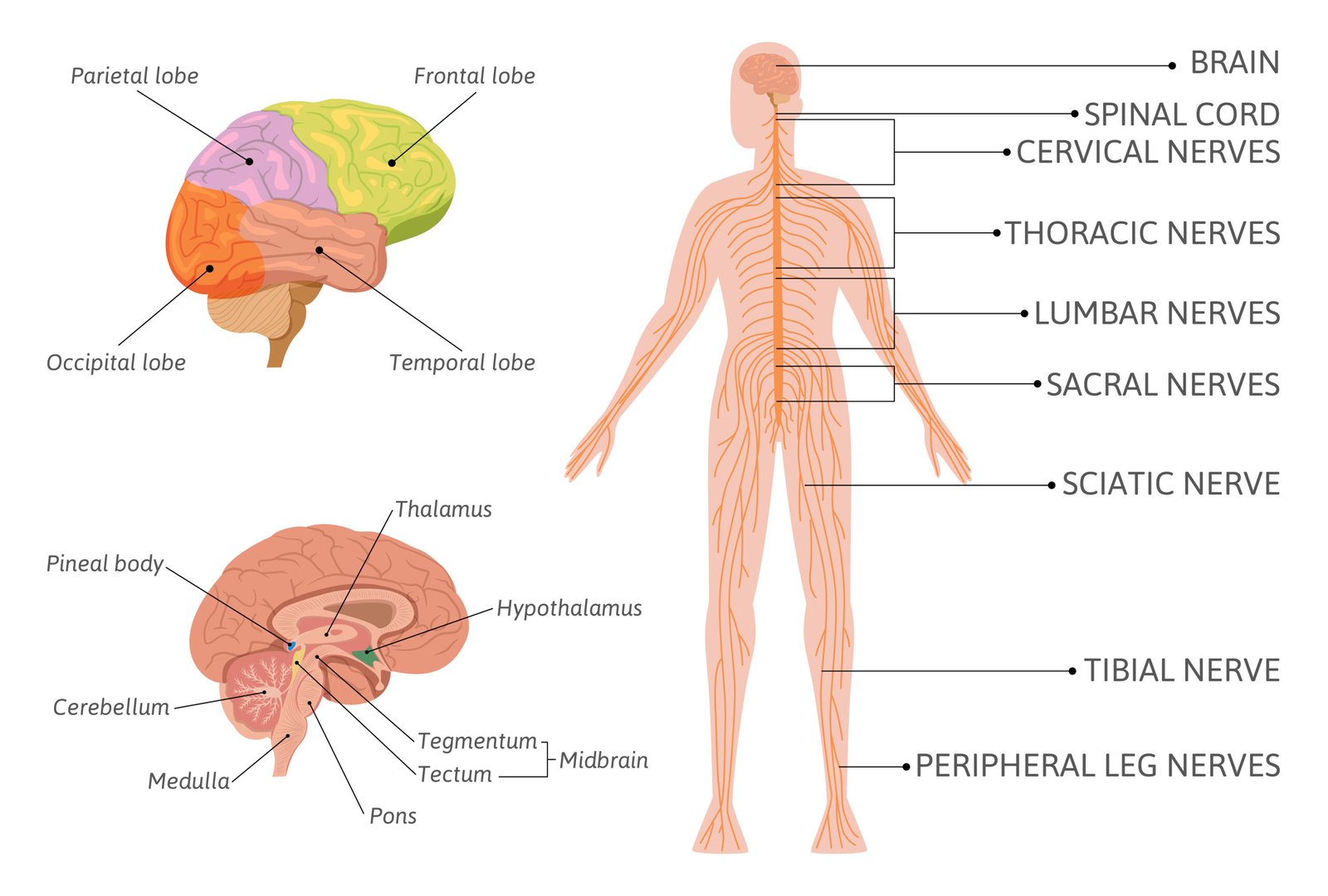The gut-brain axis (GBA) is a fascinating communication system between our gut and brain that affects both our mental and physical health. At the heart of this connection are trillions of microorganisms living in our digestive tract, known as the gut microbiota. Let’s explore how these tiny organisms play a vital role in the GBA, how they influence our brain, and how our brain, in turn, affects them.
The Role of Microbiota in the Gut-Brain Axis
Our gut is home to a diverse community of microorganisms, including bacteria, viruses, fungi, and more. These gut microbiota are essential for several bodily functions and play a crucial role in keeping us healthy.
Key Functions of Gut Microbiota
- Helping with Digestion: Gut microbiota break down complex carbs, proteins, and fats, aiding in nutrient absorption.
- Boosting Immunity: They play a significant role in developing and functioning our immune system.
- Protecting the Gut: Gut microbiota strengthen the gut barrier, preventing harmful pathogens from entering our bloodstream.
- Producing Neurotransmitters: They produce important neurotransmitters like serotonin and GABA, which are vital for brain function.
How Gut Microbiota Communicate with the Brain
Gut microbiota communicate with the brain through several pathways:
- Neural Pathways: The vagus nerve acts as a direct communication line between the gut and brain.
- Immune System: Cytokines and other immune mediators produced in the gut can influence brain function.
- Endocrine System: Gut microbiota produce hormones and neurotransmitters that can enter the bloodstream and affect brain activity.
- Metabolic Pathways: Short-chain fatty acids (SCFAs) produced by bacterial fermentation of dietary fibres impact brain health and function.
From Gut Microbiota to Brain: How the Gut Influences Mental Health
The symbiotic relationship between the gut microbiota and mental well-being, mediated by the gut-brain axis, heralds a new era in mental health understanding and treatment. Dysbiosis, an imbalance in gut microbes, correlates strongly with diverse mental health disorders, spanning from mood imbalances to complex neurological conditions. Harnessing this connection, interventions like probiotics, prebiotics, and dietary adjustments offer promising avenues for cultivating a thriving gut environment and bolstering mental resilience. As research progresses, embracing the holistic implications of the gut-brain axis promises innovative, personalized strategies that prioritize comprehensive mental wellness, acknowledging the pivotal role of the gut in shaping our cognitive and emotional landscape.
Gut Microbiota and Mood
The gut microbiota’s influence on mood represents a burgeoning frontier in health research. Dysbiosis, an imbalance in gut microbes, is intricately linked with fluctuations in mood and emotional well-being. This connection has sparked interest in interventions like probiotics, prebiotics, and dietary modifications as potential tools for fostering a balanced gut environment and enhancing mood stability. As investigations deepen, understanding the interplay between gut microbiota and mood holds promise for innovative approaches to mental wellness, highlighting the profound impact of gut health on our emotional state.
Gut Microbiota and Cognitive Function
The burgeoning field of research surrounding gut microbiota and cognitive function unveils a profound relationship with far-reaching implications. Imbalances in gut microbes, known as dysbiosis, are intricately linked to cognitive decline and neurological conditions. Interventions like probiotics, prebiotics, and dietary modifications offer promising avenues for nurturing a balanced gut environment and preserving cognitive vitality. As our understanding deepens, embracing the symbiotic nature of the gut-brain axis promises tailored interventions that prioritize cognitive wellness, illuminating the pivotal role of gut health in shaping cognitive function.
Gut Microbiota and Neurodegenerative Diseases
Exploring the intricate interplay between gut microbiota and neurodegenerative diseases reveals a compelling connection along the gut-brain axis. Dysbiosis, the imbalance in gut microbes, emerges as a significant factor in the onset and progression of conditions like Alzheimer’s and Parkinson’s diseases. Innovative interventions, such as probiotics, prebiotics, and dietary modifications, hold promise in shaping a healthier gut environment and potentially mitigating neurodegenerative risks. Embracing this symbiotic relationship offers a pathway towards tailored strategies that prioritize holistic brain health, recognizing the pivotal role of the gut in influencing neurological outcomes.
From Brain to Gut Microbiota: How the Brain Influences the Gut
The intricate interplay between the brain and gut microbiota unveils a crucial dynamic in human health. Signals from the brain, via the gut-brain axis, wield considerable influence over the composition and function of gut microbes. Stress, emotions, and neurological conditions can disrupt this balance, leading to dysbiosis and gastrointestinal issues. Understanding this bidirectional relationship opens avenues for interventions like mindfulness, stress management, and cognitive therapies to positively influence gut health. By recognizing the brain’s role in shaping gut microbiota, we pave the way for holistic approaches to health that prioritize the brain-gut connection.
Stress and Gut Health
- Stress Hormones: Chronic stress can alter gut permeability and the composition of microbiota. Stress hormones like cortisol can disrupt the gut barrier, leading to a condition known as “leaky gut,” which allows harmful substances to enter the bloodstream.
- Autonomic Nervous System: The autonomic nervous system, which regulates involuntary physiological functions, can influence gut motility, secretion, and blood flow, affecting the habitat of gut microbiota.
Emotional State and Gut Function
- Anxiety and Digestion: Anxiety and other emotional states can affect digestive processes, leading to conditions like irritable bowel syndrome (IBS). IBS patients often exhibit gut dysbiosis, suggesting a strong brain-gut interaction.
- Depression and Microbiota: Depression can alter eating habits and sleep patterns, significantly impacting gut microbiota. Antidepressants also affect the composition of the gut microbiota, indicating a complex interplay between treatment and gut health.
Neurotransmitters and Gut Microbiota
The brain’s production of neurotransmitters can influence gut health. For example, serotonin impacts gut motility and secretion, and the gut’s production of neurotransmitters can affect brain function, demonstrating the intricate balance of this system.
Practical Tips for a Healthy Gut-Brain Axis
When it comes to nurturing the bond between your gut and your mind, simple yet effective steps can make a world of difference. Start by embracing a diverse diet packed with fiber-rich foods like fruits, veggies, and whole grains. These goodies serve as fuel for the friendly bacteria in your gut, keeping things balanced and happy.
Don’t forget about fermented foods either! Incorporating treats like yogurt, kefir, and sauerkraut adds an extra boost of probiotics to your gut, promoting a thriving microbial community. And let’s not overlook the importance of prebiotics – foods like garlic, onions, and legumes that provide essential nourishment for those beneficial gut bugs.
Managing stress is key. Whether it’s through deep breathing, meditation, or a calming yoga session, finding ways to unwind can work wonders for your gut health. Prioritize quality sleep and regular exercise too – they’re not just good for your body, but they also support a healthy gut-brain axis.
And hey, be mindful of antibiotics – they’re lifesavers when needed, but overuse can throw your gut bacteria out of whack. Lastly, try to minimize exposure to harmful chemicals in your environment. Opt for organic foods and ditch those harsh household cleaners whenever possible.
By weaving these practical tips into your daily routine, you’re giving your gut and your brain the love and care they need to thrive together.
Conclusion
The gut-brain axis highlights the incredible interconnectedness of our body. Gut microbiota play a crucial role in this communication network, influencing everything from mood and cognition to overall mental health. Conversely, our brain significantly impacts gut health. By understanding and supporting this complex system, we can improve both our mental and physical well-being. A healthy diet, stress management, and beneficial lifestyle practices are key steps to optimising the gut-brain axis. As research in this field continues to evolve, it holds the promise of new insights and treatments for various conditions, from depression and anxiety to neurodegenerative diseases.




